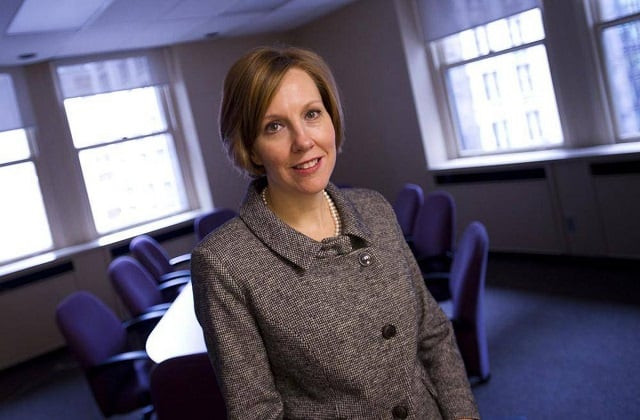Despite #MeToo, US workers fear speaking out about sexual harassment
Unlikely that corporations would take significant actions to end culture of silence, say experts

CEO of Catalyst Deborah Gillis
PHOTO: THE GLOBE AND MAIL
On some mornings, she vomited before going to work because she was so anxious about seeing a manager who made endless sexual innuendos - which eventually drove her to quit. "That guy was motivated by real contempt for women," said Kate, 43, by phone, declining to give her surname. Kate said she did not dare speak out until her last day at the Boston firm, when she complained to human resources.
Such reluctance to report sexual harassment is common, experts said, as people often fear they will not be taken seriously, be branded a complainer, get colleagues fired or lose their own jobs. While allegations of Hollywood producer Harvey Weinstein's predatory sexual behavior have moved millions of women to share their stories of abuse on social media with the hashtag #MeToo, experts doubt there will be much change in the workplace.
London named best megacity for women; mayor says more to be done
"In the aftermath of the Weinstein scandal, we have not been informed about any new commitments ... companies are taking to fight against sexual harassment," said Deborah Gillis, head of Catalyst, a non-profit advocating for women in business. Only one of the 20 top Fortune 500 largest US companies responded to queries from the Thomon Reuters Foundation as to whether the recent scandals had prompted them to revisit their sexual harassment policies.
"Harassment, even in its most subtle forms, directly conflicts with company policy," a spokeswoman for Exxon Mobil said in emailed comments, adding that the oil producer had a zero tolerance policy toward harassment. The remainder declined to comment or did not respond.
Yet sexual harassment in the workplace is ubiquitous, experts say. Between 25 to 85 percent of women reported being sexually harassed at work, a 2016 report by the U.S. Equal Employment Opportunity Commission (EEOC) found.
But the federal agency, which is responsible for handling such allegations, received less than 10,000 complaints a year between 2011 and 2016. The EEOC found that employees routinely fail to report harassment because they anticipate negative reactions, such as being blamed for undermining morale or subjected to retaliation that could damage their career or personal reputation.
Zero Tolerance
US companies' reaction to the raging public debate about harassment has been muted. Experts said it was unlikely that corporations would take significant actions that could end a culture of silence over workplace abuse.
"These scandals, if anything, are going to get organizations to dust off their copies of their (harassment) policies," Margaret Stockdale, a professor of psychology at the Indiana University-Purdue University (IUPUI), said by phone. Some firms would also likely retrain employees and issue notices that sexual harassment is not tolerated, she added.
Managers at Amazon and the global advertising firm Interpublic Group of Companies sent zero tolerance memos to their staff last month, according to media reports. Fidelity Investments chairman, Abigail Johnson, also sent a video message to staff about the Boston-based company's "no tolerance" policy, after two managers accused of sexual harassment were fired.
Woman stirs up a storm by taking selfies with her catcallers
But such policies risk backfiring, said Meg Bond, a psychology professor at the University of Massachusetts Lowell. "If immediately the axe will always fall, it sounds tough. But what (research) found is that it sometimes discourages people from raising those issues," she said. "You're not ready to raise it in a way that is going to get somebody fired," she said in a phone interview.
Zoe Chance, an assistant professor of marketing at Yale University who has written on sexual harassment, said new approaches are necessary - but it is not clear what works. "Doing more of what companies are already doing, I don't think will yield positive results," she said.
Up-and-coming initiatives include training bystanders to speak up when witnessing harassment, and to assess employees' ability to treat colleagues with respect as part of their performances reviews, Bond said. Stockdale of IUPUI said programs which track acts of retaliation by those accused of harassment also appear promising in encouraging victims to speak out.
Back in Boston, Kate, who told her story as part of the #MeToo movement, has modest expectations. She first went public on Twitter a year ago, when the nation was abuzz over a video showing Donald Trump brag about grabbing women by the genitals as he was running for the presidency. "I hope this isn't a blip," she said. "We had this identical conversation last year."



















COMMENTS
Comments are moderated and generally will be posted if they are on-topic and not abusive.
For more information, please see our Comments FAQ